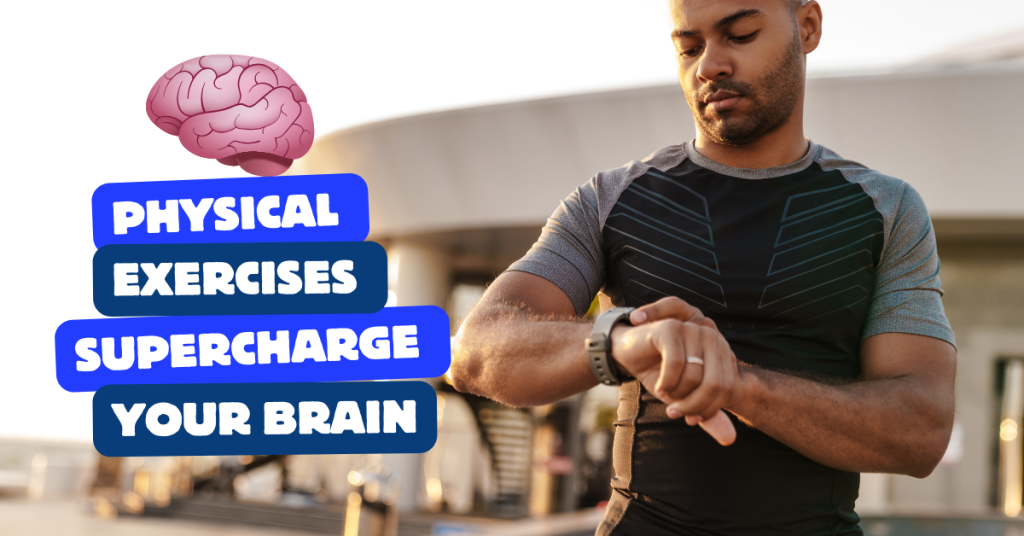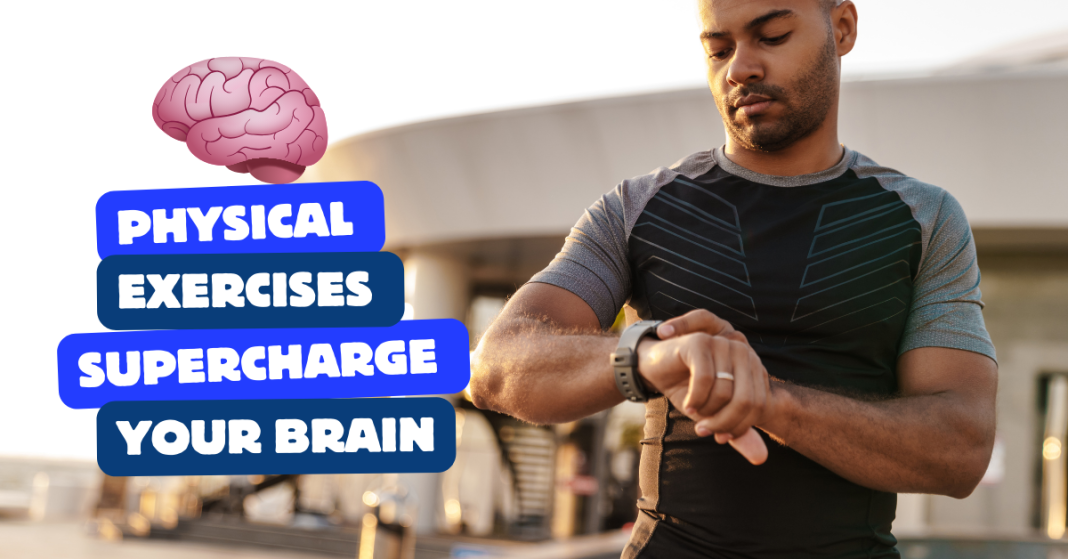Table of Contents
We all know that physical exercise is crucial for maintaining a healthy body, but did you know that physical exercises supercharge your brain as well? Engaging in regular physical activity can significantly enhance your cognitive functions, improve your mood, and protect your brain from various ailments. In this article, we will delve into how physical exercises supercharge your brain and provide actionable tips to integrate these activities into your daily routine.
The Science Behind Physical Exercise and Brain Health
To understand how physical exercises supercharge your brain, it’s important to grasp the underlying science. Physical exercise increases heart rate, which pumps more oxygen to the brain. This stimulates the release of beneficial hormones and promotes the growth of new blood vessels and brain cells, particularly in the hippocampus, an area critical for memory and learning.
1. Increased Blood Flow and Oxygenation
One of the primary ways physical exercises supercharge your brain is by increasing blood flow and oxygenation. During exercise, the heart pumps more blood, which carries oxygen and nutrients to the brain. This improved circulation helps in maintaining healthy brain cells and can enhance overall brain function.
2. Release of Neurotransmitters
Exercise triggers the release of various neurotransmitters, including dopamine, serotonin, and norepinephrine. These chemicals play vital roles in regulating mood, motivation, and attention. The increase in these neurotransmitters can lead to improved focus, concentration, and a reduction in symptoms of depression and anxiety.
3. Neurogenesis and Brain Plasticity
Physical exercise promotes neurogenesis, the process of generating new neurons in the brain. It also enhances brain plasticity, which is the brain’s ability to adapt and reorganize itself. These processes are crucial for learning, memory, and overall cognitive health.
Benefits of Physical Exercise on Brain Health
Understanding the specific benefits can further illustrate how physical exercises supercharge your brain. Here are some key cognitive and mental health advantages:
1. Enhanced Memory and Learning
Regular physical exercise has been shown to improve memory and learning capabilities. The growth of new neurons and the increased connectivity between brain cells contribute to better information processing and retention.
2. Improved Mood and Emotional Health
Exercise is a powerful mood booster. The release of endorphins during physical activity can create feelings of happiness and euphoria. Additionally, regular exercise can help manage stress, reduce anxiety, and combat depression, all of which are essential for maintaining emotional health.
3. Protection Against Cognitive Decline
Engaging in physical exercise can protect the brain from age-related cognitive decline and neurodegenerative diseases such as Alzheimer’s and Parkinson’s. The increased blood flow and the growth of new brain cells help maintain cognitive function and delay the onset of these conditions.
4. Better Focus and Concentration
Exercise can enhance your ability to focus and concentrate by increasing the production of neurotransmitters that regulate attention and motivation. This can be particularly beneficial for individuals with attention deficit disorders.
Types of Exercises That Supercharge Your Brain
Not all exercises are created equal when it comes to brain health. Here are some types of physical activities that are particularly effective:
1. Aerobic Exercises
Aerobic exercises, such as running, cycling, and swimming, are excellent for increasing heart rate and improving cardiovascular health. These exercises are highly effective in boosting brain function and promoting the growth of new brain cells.
2. Strength Training
Strength training, including weight lifting and resistance exercises, also benefits the brain. It increases levels of growth factors, which are essential for brain health. Additionally, it can improve mood and reduce symptoms of anxiety and depression.
3. Yoga and Mindfulness Exercises
Yoga and mindfulness exercises combine physical activity with mental focus, making them particularly beneficial for brain health. These practices can enhance memory, improve mood, and reduce stress by promoting relaxation and mental clarity.
4. Coordination and Balance Exercises
Activities that require coordination and balance, such as dance or martial arts, can improve brain plasticity and cognitive function. These exercises challenge the brain to learn new patterns and movements, which can enhance overall brain health.
Tips for Incorporating Brain-Boosting Exercises into Your Routine
Knowing that physical exercises supercharge your brain is one thing, but incorporating them into your daily routine can be challenging. Here are some practical tips to help you get started:
1. Start Small
If you’re new to exercise, start with small, manageable goals. Aim for short, daily sessions of physical activity and gradually increase the duration and intensity as your fitness improves.
2. Find Activities You Enjoy
Choose exercises that you enjoy, whether it’s dancing, swimming, or playing a sport. When you find joy in your activities, you’re more likely to stick with them long-term.
3. Schedule Regular Exercise
Make exercise a regular part of your routine by scheduling it into your day. Consistency is key to reaping the cognitive benefits of physical activity.
4. Mix It Up
Incorporate a variety of exercises into your routine to keep things interesting and to ensure that you’re targeting different aspects of brain health. Combining aerobic exercises, strength training, and mindfulness practices can provide comprehensive benefits.
5. Stay Social
Exercising with others can boost motivation and make physical activity more enjoyable. Join a fitness class, start a walking group, or find a workout buddy to keep you accountable and engaged.
Real-Life Success Stories
Hearing about others’ success can be incredibly motivating. Here are a few real-life stories that demonstrate how physical exercises supercharge your brain and improve overall well-being:
1. Jane’s Journey to Better Memory
Jane, a 45-year-old teacher, struggled with memory issues and stress. She started incorporating daily walks and yoga sessions into her routine. Over time, she noticed significant improvements in her memory, reduced stress levels, and a more positive outlook on life.
2. Mark’s Mood Transformation
Mark, a 30-year-old software engineer, battled depression and anxiety. After starting a strength training program and joining a local running club, he experienced a remarkable improvement in his mood and energy levels. The regular physical activity helped him manage his symptoms and feel more in control of his mental health.
3. Lisa’s Focus and Productivity Boost
Lisa, a 28-year-old marketing professional, found it difficult to concentrate at work. She began integrating short bursts of aerobic exercise, like jumping jacks and brisk walks, into her daily routine. These activities increased her focus and productivity, making her more efficient and satisfied with her work.

Advanced Strategies to Supercharge Your Brain with Exercise
While the basic principles of incorporating physical exercise into your routine are essential, there are advanced strategies that can further enhance your brainpower. These strategies can be tailored to your personal preferences and fitness levels.
1. High-Intensity Interval Training (HIIT)
High-Intensity Interval Training (HIIT) involves short bursts of intense exercise followed by brief periods of rest or low-intensity exercise. HIIT is known to significantly boost brain health by:
- Enhancing Brain-Derived Neurotrophic Factor (BDNF): HIIT increases the production of BDNF, a protein that supports the survival of existing neurons and encourages the growth of new neurons and synapses.
- Improving Memory and Learning: The intense physical activity in HIIT has been shown to enhance memory and learning capabilities, making it a powerful tool for cognitive enhancement.
2. Dual-Task Training
Dual-task training involves performing physical and cognitive tasks simultaneously. This type of training can significantly boost brain health by challenging the brain to process multiple types of information at once. Examples include:
- Dance: Following choreography requires memorizing steps while moving your body in rhythm, combining physical and mental exercise.
- Martial Arts: Practicing martial arts involves learning and executing complex movements while maintaining focus and balance.
Nutrition and Exercise: A Powerful Combination
Pairing the right nutrition with physical exercise can further amplify the benefits for your brain. Here are some dietary tips to support your brain health:
1. Consume Omega-3 Fatty Acids
Omega-3 fatty acids, found in fatty fish, flaxseeds, and walnuts, are crucial for brain health. They support cognitive functions and can enhance the benefits of physical exercise by promoting neurogenesis and reducing inflammation.
2. Stay Hydrated
Hydration is essential for maintaining optimal brain function. Drinking enough water before, during, and after exercise ensures that your brain stays hydrated, which is vital for concentration, mood, and overall cognitive performance.
3. Eat Antioxidant-Rich Foods
Foods rich in antioxidants, such as berries, dark chocolate, and leafy greens, protect the brain from oxidative stress. Combining these foods with regular physical exercise can help maintain brain health and prevent cognitive decline.
Sleep: The Overlooked Factor in Brain Health
Adequate sleep is a critical component of how physical exercises supercharge your brain. Quality sleep allows your brain to recover and consolidate memories formed during the day. Here’s how to optimize your sleep:
1. Maintain a Regular Sleep Schedule
Going to bed and waking up at the same time each day helps regulate your body’s internal clock. Consistent sleep patterns improve the quality of your sleep and enhance the brain’s ability to process and store information.
2. Create a Sleep-Friendly Environment
Ensure your bedroom is conducive to sleep by keeping it dark, quiet, and cool. Consider using blackout curtains, earplugs, or white noise machines to minimize disruptions.
3. Limit Stimulants Before Bed
Avoid consuming caffeine, nicotine, and large meals close to bedtime. These stimulants can interfere with your ability to fall asleep and reduce the overall quality of your rest.
Incorporating Mindfulness and Meditation
Mindfulness and meditation practices can complement physical exercise by further enhancing brain function and reducing stress. These practices focus on maintaining awareness of the present moment, which can have profound effects on your mental health.
1. Mindfulness Meditation
Mindfulness meditation involves focusing on your breath and being present in the moment. Regular practice can improve attention, reduce stress, and increase gray matter density in the brain, which is associated with better cognitive function.
2. Yoga
Yoga combines physical exercise with mindfulness, making it an excellent choice for brain health. The combination of movement, breath control, and meditation in yoga promotes relaxation and enhances brain function.
Social Interaction and Brain Health
Engaging in physical activities that involve social interaction can further boost the cognitive benefits. Social activities stimulate the brain by requiring communication, problem-solving, and emotional regulation.
1. Team Sports
Participating in team sports, such as soccer, basketball, or volleyball, combines physical exercise with social interaction. These activities enhance brain function by improving coordination, strategy, and teamwork.
2. Group Fitness Classes
Joining group fitness classes, like aerobics, spinning, or dance classes, provides both physical exercise and opportunities for social interaction. The social aspect can increase motivation and make exercise more enjoyable.
Case Studies: Real-Life Transformations
To illustrate how physical exercises supercharge your brain, here are some more inspiring case studies of individuals who have experienced significant improvements in their cognitive and mental health through regular physical activity.
1. Sarah’s Stress Reduction
Sarah, a 35-year-old lawyer, struggled with high stress and anxiety levels due to her demanding job. She started practicing yoga and mindfulness meditation regularly. Within a few months, she noticed a substantial reduction in her stress levels, improved focus, and a more positive outlook on life. Her ability to manage work-related pressure improved significantly.
2. Tom’s Cognitive Boost
Tom, a 50-year-old executive, felt his cognitive abilities were declining with age. He incorporated HIIT and strength training into his routine. After six months, Tom reported enhanced memory, quicker problem-solving skills, and better overall cognitive function. His newfound physical fitness also boosted his confidence and energy levels.
3. Maria’s Mood Improvement
Maria, a 28-year-old teacher, dealt with chronic depression. She began attending dance classes twice a week and found that the combination of physical activity and social interaction greatly improved her mood. Over time, Maria felt happier, more energetic, and better able to cope with the challenges of her daily life.
Expert Opinions on Exercise and Brain Health
Experts in neuroscience and fitness advocate for the integration of physical exercise into daily routines for optimal brain health. Here are some insights from leading professionals:
1. Dr. John Ratey, Psychiatrist
Dr. Ratey, an expert in neuropsychiatry, emphasizes the importance of exercise for brain health. In his book, “Spark: The Revolutionary New Science of Exercise and the Brain,” he explains how physical activity can enhance learning, reduce stress, and protect against cognitive decline.
2. Dr. Wendy Suzuki, Neuroscientist
Dr. Suzuki, a renowned neuroscientist, highlights the long-term cognitive benefits of exercise. She advocates for incorporating a variety of physical activities to maximize brain health and suggests that even small amounts of exercise can have significant positive effects.
3. Dr. Mark Hyman, Functional Medicine Specialist
Dr. Hyman, a functional medicine specialist, recommends a holistic approach to brain health that includes regular exercise, proper nutrition, and stress management. He believes that combining these elements can lead to optimal cognitive function and overall well-being.
Physical Exercises Supercharge Your Brain Physical Exercises Supercharge Your Brain Physical Exercises Supercharge Your Brain Physical Exercises Supercharge Your Brain Physical Exercises Supercharge Your Brain Physical Exercises Supercharge Your Brain Physical Exercises Supercharge Your Brain Physical Exercises Supercharge Your Brain Physical Exercises Supercharge Your Brain Physical Exercises Supercharge Your Brain Physical Exercises Supercharge Your Brain Physical Exercises Supercharge Your Brain Physical Exercises Supercharge Your Brain Physical Exercises Supercharge Your Brain Physical Exercises Supercharge Your Brain Physical Exercises Supercharge Your Brain






